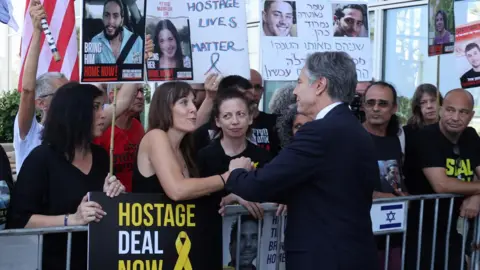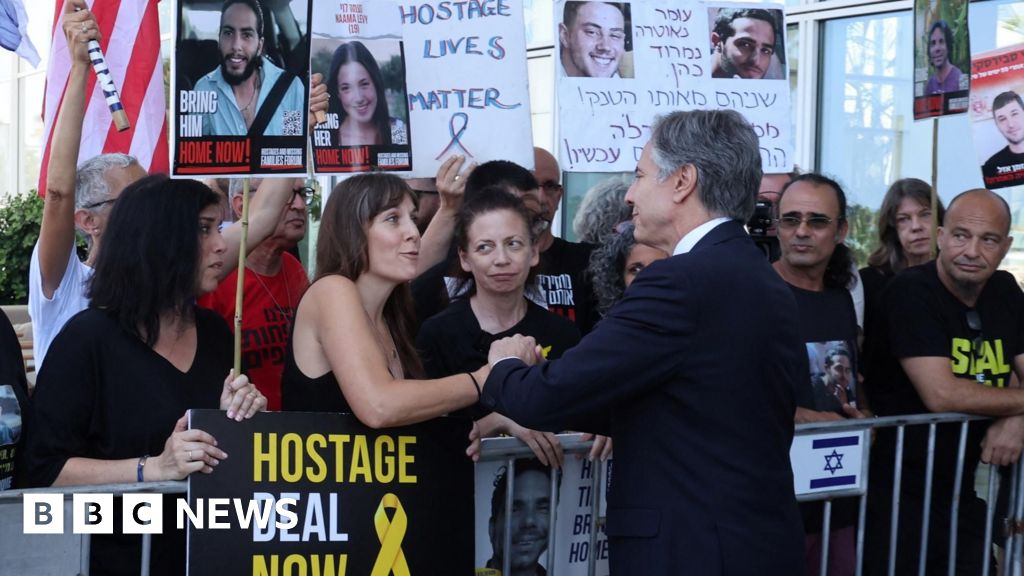By David Gritten, BBC News
 Reuters
ReutersThe US says it is evaluating the Hamas response to the latest proposal for a Gaza ceasefire and hostage release deal.
The Palestinian armed group said it was ready to “deal positively” with the process but stressed the need for Israel to agree to a permanent ceasefire.
Israel’s government has not commented, but an anonymous Israeli official said Hamas’s response amounted to a rejection.
Meanwhile, the US secretary of state is heading to Qatar – which along with the US and Egypt is acting as a mediator – to try to push the plan forward.
Antony Blinken said on Tuesday that Israeli Prime Minister Benjamin Netanyahu had “reaffirmed his commitment” to the deal, and that Hamas would be to blame if there was no progress.
However, Mr Netanyahu has not publicly endorsed the proposal, which US President Joe Biden said had been offered by Israel when he outlined it 12 days ago.
A brief statement confirmed Hamas had given an official response to the latest ceasefire plan, which has garnered broad international support and was endorsed by the UN Security Council on Monday.
This reiterated a demand for what Hamas called “a complete halt of the ongoing aggression against Gaza”, and full withdrawal of Israeli forces from the Palestinian territory.
A Hamas official, Izzat al-Rishq, said the response was “responsible, serious and positive” and that it opened up “a wide pathway” to reach an agreement.
The Israeli prime minister’s office did not release an on-record reply.
But a statement was issued by an anonymous Israeli official, who said that Hamas had “changed all of the main and most meaningful parameters” and “rejected the proposal for a hostage release that was presented by President Biden”.
The more critical reaction is now awaited from mediators – particularly, the US – once they have studied the proposal and judged the extent of the Hamas amendments.
“We’re in receipt of this reply that Hamas delivered to Qatar and Egypt and we are evaluating it right now,” White House National Security Council spokesman John Kirby told reporters on Tuesday, without elaborating.
Qatar and Egypt said in a joint statement that they would study Hamas’s response and “co-ordinate with the parties concerned regarding the next steps”. They also pledged to continue their mediation efforts with the US “until an agreement is reached”.
 AFP
AFPThe Israeli military launched a campaign in Gaza to destroy Hamas in response to an unprecedented cross-border attack on southern Israel on 7 October, during which about 1,200 people were killed and 251 others were taken hostage.
More than 37,160 people have been killed in Gaza since then, according to the territory’s Hamas-run health ministry.
A deal agreed in November saw Hamas release 105 of the hostages in return for a week-long ceasefire and some 240 Palestinian prisoners in Israeli jails. Israel says 116 hostages are still being held, 41 of whom are presumed dead.
Mr Biden said the new proposal involved three phases.
The first would see an initial six-week ceasefire, when Hamas would release some of the hostages – including women, the elderly and the sick or wounded – in exchange for Israel releasing an undefined number of Palestinian prisoners.
A second phase would see all remaining living hostages released and the withdrawal of Israeli forces from Gaza as part of a permanent “cessation of hostilities”, but the latter would still be subject to further negotiations.
In the third phase, the remains of any dead hostages would be returned and a major reconstruction plan for Gaza would commence.
Mr Netanyahu has acknowledged that his war cabinet has authorised the plan, but has not unequivocally voiced support for it. Far-right members of his cabinet have threatened to quit his coalition and trigger its collapse if the deal goes forward, seeing it as surrender to Hamas.
The actual Israeli proposal – reportedly lengthier than the summary presented by Mr Biden – has not been made public and it is unclear whether it varies from what Mr Biden conveyed. It was presented to Hamas days before Mr Biden’s speech.


